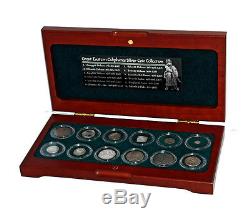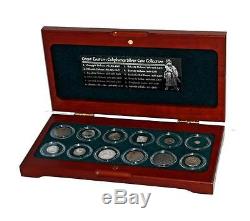
- Index
- Certification
- Coin
- Composition
- .999 Silver (10)
- .9999 Silver (28)
- 99.99% Pure Silver (29)
- Aluminum (18)
- Bi-metallic (6)
- Billon (10)
- Bronze (54)
- Copper (12)
- Gold (37)
- Gold And Silver (9)
- Gold, Silver (8)
- Nickel (9)
- Pure Silver (14)
- Silver (3536)
- Silver .999 (5)
- Silver 925 / 1000 (13)
- Silver 999 / 1000 (8)
- Silver Certificate (7)
- Silver With Opal (5)
- Varies (6)
- ... (2034)
- Denomination
- Grade
- Year
World Coins GREAT EASTERN CALIPHATES 12 SILVER COINS COLLECTION




Islamic cultures were known as Caliphates, each ruled by a Caliph--often also referred to as "Commander of the Faithful" in essence. At first there was only one Caliphate.
Due to schisms, fragmentation, invasions and The Caliphate - Iswars. Within the Islamic empire over the centuries, there were often more than one claimant to the title of Caliph. The use of the term.
Caliphate ended in 1924 after the demise of the Ottoman Empire. The Islamic Golden Age - While Europe essentially stagnated intellectually during the early Middle Ages, an advanced culture was. The Islamic Golden Age lasted from the 8th to 12th century, beginning with the ascent of the Abbasid Caliphate.And the transfer of the capital from Damascus to Baghdad. Among the guiding Quranic principles was: the ink of a scholar is more. Holy than the blood of a martyrtestimony to the importance of the value of knowledge at that time. It is often overlooked by Western Historians that during this period the Muslim world became the unrivaled intellectual center for. Science, philosophy, medicine and education as the Abbasids championed the cause of knowledge and established the House of Wisdom.
In Baghdad; where both Muslim and non-Muslim scholars sought to translate and gather all the world's knowledge into Arabic. Development of written Arabic was closely linked to the need to fix the language of the Quranthe Muslim holy book. Works of antiquity that would otherwise have been lost were translated into Arabic and Persian and later in turn translated into. During this period the Muslim world was a cauldron of cultures which collected, synthesized and. Significantly advanced the knowledge gained from the ancient Roman, Chinese, Indian, Persian, Egyptian, North African, Greek and.
It is asserted by some that during the ninth and tenth centuries, more scientific discoveries had been achieved. Than in any previous period of history. Decline- A great number of reasons have been cited as factors contributing to the decline of this intellectual dominance; they include. Wars and factional conflicts, economic factors and the invasions by Crusaders and Mongols between the 11th and 13th centuries.
Especially the Mongol invasions of the 13th century. The Mongols destroyed Muslim libraries, observatories, hospitals, and universities. Culminating in the destruction of Baghdad, the Abbasid capital and intellectual centre, in 1258, which is traditionally understood to. Have marked an end of the Islamic Golden Age.
Typical assemblage of coins-list may vary. 1 UMAYYAD DIRHAM 7/-8th CAD 7 ILKHANID DIRHAM 13/14th CAD. 2 ABBASID DIRHAM 8/13th CAD 8 ERETNID DIRHAM 14th CAD. 3 AYYUBID DIRHAM 12/13th CAD 9 MUZZAFFARID 2 DINARS 14th CAD.4 ALMOHAD DIRHAM 12/13th CAD 10 TIMURID TANKA 14TH 15th CAD. 5 MAMLUK DIRHAM 13/16th CAD 11 SHAYBANID TANKA 16th CAD.
6 OTTOMAN FRACTION 13/17th CAD 12 SAFAVID 4 SHAHI 17th CAD. Box measures: 10 3/4 X 5 5/8 X 1 3/8. All coins in each set are protected in an. Archival capsule and beautifully displayed. In a custom-made cherry hard wood box.The box set is accompanied with an. Engraved plaque, certificate of authenticity. And a black embossed gift box.
Coin type and grade may vary somewhat. The item "World Coins GREAT EASTERN CALIPHATES 12 SILVER COINS COLLECTION" is in sale since Saturday, June 27, 2015.This item is in the category "Coins & Paper Money\Coins\ World\Collections, Lots". The seller is "helzelscoins2" and is located in Greensburg, Pennsylvania. This item can be shipped worldwide.

